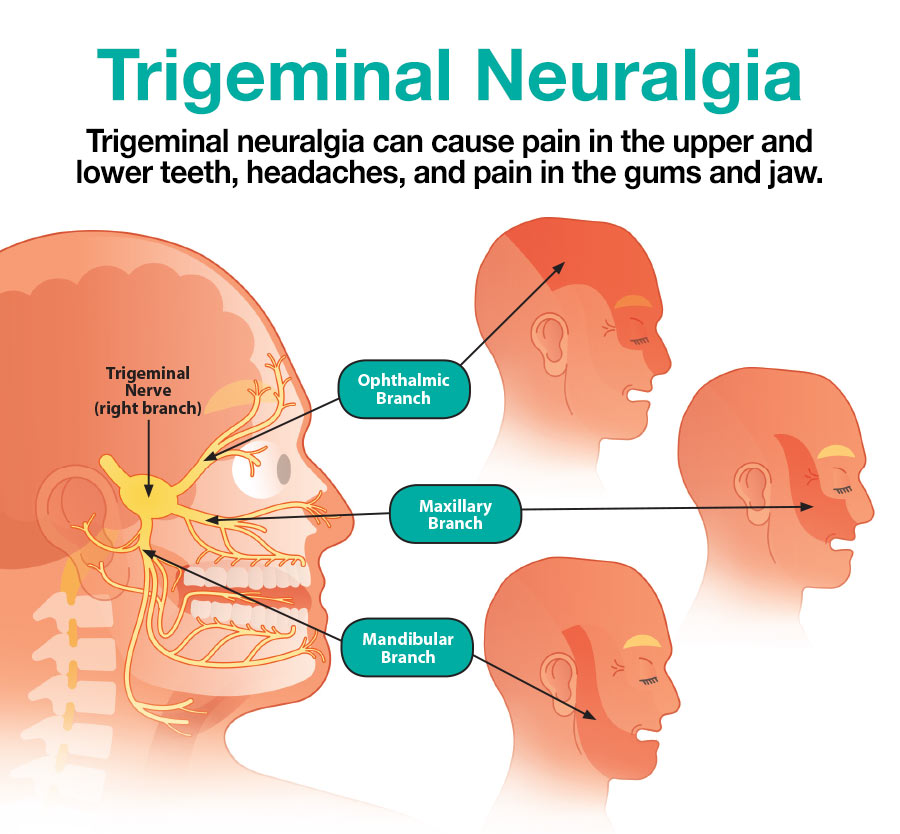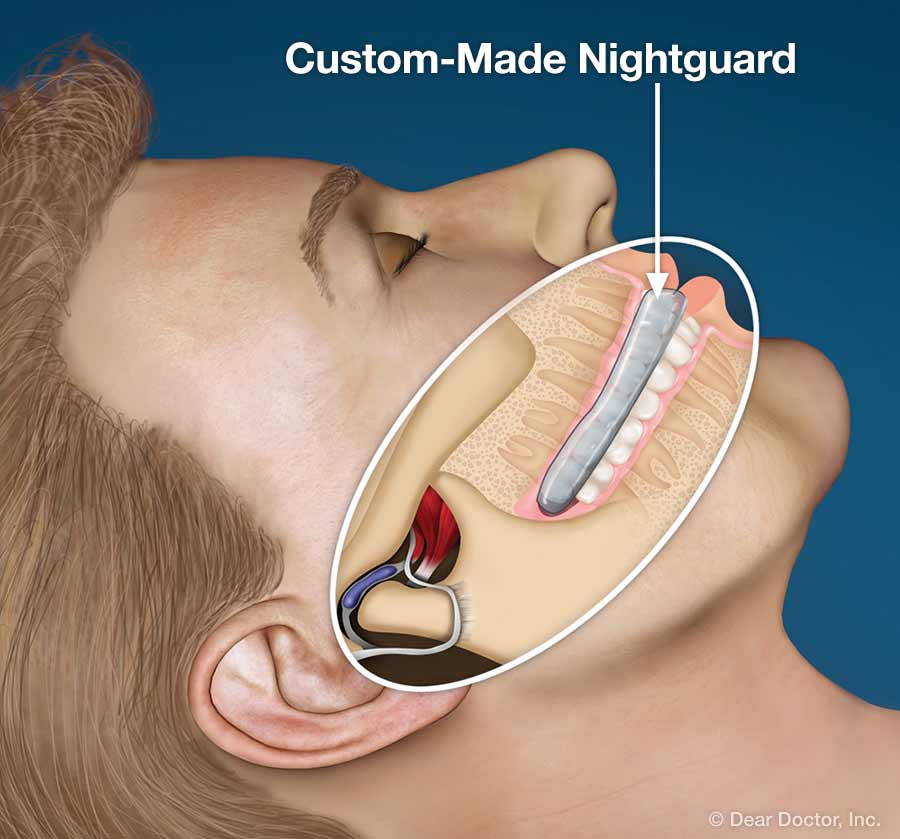Referred Pain
When a Toothache Is Not Really a Toothache
 |
What do you do when you're suffering from a toothache? For most people, the first and most logical step is to call your dentist. After all, tooth pain is usually caused by a dental problem—such as tooth decay, a cracked tooth, an infection in the tooth or gums, an impacted wisdom tooth or a failing filling or crown. However, some people visit their dentist for a toothache only to be told there is nothing obviously wrong with their teeth. The frustration of dental pain that won't go away may prompt them to visit the dentist again and again, where they may request procedures such as root canals and even tooth extractions in an attempt to relieve the pain.
But in this situation, removing the aching tooth may bring only temporary relief—or no relief at all. That's because pain felt in one area sometimes stems from a different source. This is what medical professionals call "referred pain." In such instances, it's wise to avoid any invasive or irreversible procedure until the true cause of the pain has been determined. While it may be inconvenient to visit another dental office, the best option at this point may be an evaluation by a dentist who specializes in the treatment of orofacial ("oro" – relating to the mouth; "facial" – relating to the face) pain. Pinpointing the cause of the pain provides the best chance for accurate diagnosis and successful treatment.
Non-Dental Causes of Tooth Pain
Pain that is felt as a toothache can be referred from several other sources, including muscles, nerves and other parts of the body. Here are some possible non-dental causes of tooth pain:
Nerve Disorders
A painful nerve condition called trigeminal neuralgia is often confused with a bad toothache. The trigeminal nerve—actually a pair of primarily sensory nerves—leaves the brain at the base of the skull and travels through soft tissue to reach each side of the face. Each of the nerves has three big branches that primarily feed sensation to the face and jaw but also feeds muscles to enable chewing. While the exact cause of trigeminal neuralgia isn't always clear, inflammation of the trigeminal nerve or a blood vessel in the brain pressing on the nerve or even a growth or tumor could be to blame. The condition can cause excruciating pain in the teeth, gums or jaw, almost always on just one side.
 |
| Trigeminal neuralgia can cause pain in the upper and lower teeth, headaches, and pain in the gums and jaw.
Click to enlarge |
Various other problems in the nervous system can also cause pain to be referred to the mouth and face. Phantom pain may be felt where previous dental work has occurred, such as a tooth extraction or root canal procedure. In addition, when transmission of a nerve signal goes awry, a variety of effects may be produced at any point between the sensory end of the nerve and the brain—for example, a change in response that could result in your feeling pain instead of feeling cold. Further, an injury to a nerve may cause pain to be felt anywhere along the nerve, including the teeth, gums and jaw.
Temporomandibular Joint Disorder (TMD)
One of the main non-dental reasons for tooth or facial pain is a temporomandibular joint disorder (TMD), a problem with the pair of joints that hinge the lower jaw to the upper jaw and skull. Pain that begins in or around the temporomandibular joints can be experienced elsewhere, sometimes mimicking a toothache. In this situation, working on the suspect tooth will not resolve the pain. Some general dentists diagnose and treat TMD, or you may be advised to consult with a dentist whose practice focuses on managing orofacial pain or a rheumatologist.
Ear Infection
It might come as a surprise, but a common source of earaches is not an ear infection but rather tooth-related pain. The ear and jaw are close to each other and their nerves are interconnected, so it's sometimes hard to tell whether you are suffering from a toothache or an earache. If a lower back tooth is infected or has an abscess, it may be perceived as an earache.
And just as an earache does not always come from the ear, what you perceive as a toothache may actually be related to ear pressure or congestion.
Sinus Condition
The upper molars are very close to the sinuses, so sinus congestion can put pressure on the nearby nerves, resulting in a toothache. If clogged sinuses are to blame for your toothache, decongestants or antihistamines may alleviate the pain; you may also be advised to see an ENT (ear, nose and throat doctor), especially if you might need to be treated with prescription medication or have your sinuses treated.
 |
| A nightguard protects the teeth from the adverse effects of clenching and grinding while sleeping. |
Jaw Clenching/Teeth Grinding
Some people clench or grind their teeth habitually, either during waking hours or while they are asleep. This can cause jaw pain, headaches or tenderness of the teeth. The condition during sleep is called sleep bruxism and can also result in worn down, chipped, broken or loosened teeth. People who habitually clench in the nighttime are commonly prescribed a nightguard, which is designed to protect the teeth from damage. However, nightguards may not stop the pain caused by bruxism. Other treatment approaches include muscle stretching exercises, medications, stress reduction techniques and lifestyle changes.
Other Non-Dental Causes of Tooth Pain
Migraines are recurring headaches that are thought to be caused by problems in the brain. A midface migraine resembles a traditional migraine—but instead of occurring in the forehead area, it is felt in the face, particularly in the upper jaw. Thus, it can easily be confused with a toothache or a sinus problem. In addition to migraine headaches, other non-dental causes of oral pain include cluster headaches, shingles, fibromyalgia and vitamin deficiencies. Some non-dental causes of tooth pain are very serious, such as heart problems and lung cancer, so dental pain should never be ignored!
What Can You Do?
As this brief survey shows, there are several issues besides dental problems that can result in tooth pain. When other pain conditions mimic dental problems, it can lead to unnecessary treatments, such as getting procedures that offer no long-term relief. That's why, when a dental cause of the tooth pain can't be established, it's unwise to proceed with any aggressive or invasive treatment or any procedure with irreversible results. Instead, you should be evaluated by a professional with experience in atypical pain. This could be a dentist with advanced training in the diagnosis and treatment of orofacial pain, an oral surgeon, an ear-nose-throat doctor or a neurologist, for example.
Dentists who are credentialed by the American Board of Orofacial Pain have completed advanced education along with passing rigorous testing and are experts in diagnosing and treating orofacial pain. You can seek out a member dentist through the American Board of Orofacial Pain (www.ABOP.net) by geographical area. The perception and treatment of pain can be a complex issue, and an approach that involves specialists from different areas is often best.



